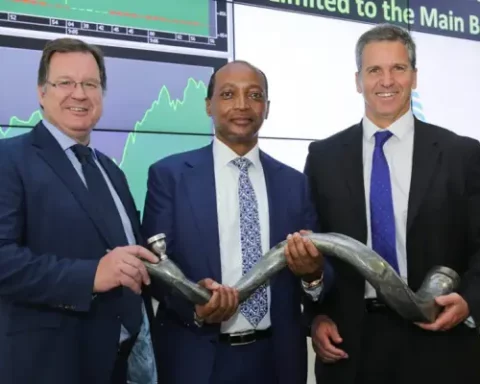Between mid-April and December 6 this year, more than 20 directors resigned from JSE-listed boards. In almost all cases, shareholders were left to guess what had happened.
Most of the resignations came with an extremely bland version of the Sens statement required by section 3.59(b) of the JSE’s listings requirements. Take for example AH-Vest’s April 12 statement advising shareholders that “Mr Jacobus Johannes Du Plooy (Jaco) has resigned as an independent non-executive director from the board of AH-Vest … The board would like to thank Jaco for his many years of excellent service and wish him well for the future.”
The really interesting part of the AH-Vest statement was the news that Du Plooy had actually left the day before the Sens statement was issued. Evidently, this was not a planned resignation. Other than that assumption, it’s impossible to know why Du Plooy, who had joined the company in 2020 and was on the audit committee, decided to leave so suddenly.
But it’s not just the smaller companies that leave investors speculating about all sorts of machinations.
A few weeks after Du Plooy’s departure, Sasol announced the latest of a disturbing number of high-profile resignations that have rocked the petrochemical giant in recent years. This time it was CFO Hanré Rossouw. He had joined Sasol just two years earlier and was now quitting for no known reason – a development that was probably more than a little disconcerting for shareholders, given the long list of departing executives. At least it wasn’t a rushed affair; Rossouw was staying on until October 31 2024. Chair Steve Westwell told shareholders that Rossouw had made “a solid contribution towards achieving Future Sasol”.
It turns out there wasn’t much “Future Sasol” for Westwell, either. A few weeks after the Rossouw announcement, Sasol issued another bland Sens in which it revealed that Westwell would be retiring on June 1. The board expressed “its gratitude and appreciation for the immense contribution made by Steve …” Again, no explanation was given though there was a puzzling reference to the fact that June 1 marked the 12th anniversary of Westwell’s appointment.
Information vacuums
The thing is, more than almost any other group of individuals you could think of, traders in investment markets hate information vacuums and will readily fill them with all manner of speculation. Was it his/her decision to leave? If so, why? Was the move prompted by something happening in his/her own life or that of the company’s?
These are not whimsical queries; the answers have potentially significant implications for the company and therefore the shareholders.
Companies seem to believe that the less said or known, the better. This may be because companies feel they are in a potentially lose-lose situation: either the “retired” director was being too independent and had to be got rid of; or the director had gone rogue and had to be got rid of.
From the director’s perspective, no matter what the circumstances, silence is deemed the best way of ensuring future lucrative board appointments.
But then, a month or so ago, everything changed. The traditional wall of silence around these events, which seemed impregnable, cracked. It was Quantum Foods, where an independent director was forced out for all the wrong reasons.
That independent director – Tanya Golden – took her fiduciary duty seriously enough to challenge her forced retirement, and to do so very publicly through the South African courts.
In November the Western Cape High Court ruled that Golden’s removal from the Quantum Foods board was “invalid, unlawful and void”. This was in stark contrast to the contents of the innocuous Sens statement issued by Quantum on May 31 2024. “Shareholders of Quantum Foods are hereby advised that Ms Tanya Justine Annalene Golden has resigned as a director of the company with effect from May 31 2024,” it read.
Not just innocuous, but totally misleading. It turns out Golden was fired from the board after she made efforts to resolve a destructive battle between the controlling shareholder and a major investor. Just what you’d hope a skilled and independent director would do.
The need for details
Golden’s battle to reverse her removal, necessitated by the board’s dysfunctionality, is probably an investors’ worst nightmare. But how is it that without her bravery independent shareholders would be none the wiser about the value-destroying ructions at the company? Shouldn’t the stock exchange be demanding something a little more useful than the statements now being issued?
For instance, what more is there to know about Du Plooy’s departure from AH-Vest?
Or Warren Chapman’s sudden departure from enX earlier this year; a move followed by the equally sudden departure of the company’s CEO in late September.
Bob Head’s unexpected (by non-insiders) resignation from Alexander Forbes late last month surely deserves some explanation given that he was out the door a week later, too.
EOH is going through challenging times and so perhaps abrupt resignations are to be expected, still the resignation of an independent non-executive director does deserve a few words of explanation. So too does Sipho Ngidi’s decision not to stand for re-election, announced just the day before EOH’s recent AGM.
Similarly at Nedbank there was no explanation as to why William Mzimba had decided not to join the board.
AfroCentric’s tepid announcement about the departure of its long-serving CFO Hannes Boonzaaier seemed inappropriate given his years of service. Was the board perhaps irked that Boonzaaier was off to take up the CFO slot at AdvTech? And why not tell shareholders he was leaving to take up another post?
That’s what Spar did when it announced the departure of independent non-executive director Trudi Makhaya, who’s off to take up a full-time job with Boston Consulting Group. After a spate of dramatic high-profile resignations a few years ago, Spar has learnt how to handle departures – which is with as much detail and notice as possible. The grocery wholesaler informed shareholders all the way back in June about the December departure of its CFO.
It’s not an example Santam and Insimbi Alloy Supplies seem intent on following. They owe their shareholders a few more details about departed directors.
And then there are Ayo and Murray & Roberts. Their current circumstances lend themselves to the grimmest sort of speculation about top-level departures.
Perhaps it’s time for the JSE to introduce some sort of golden disclosure guidelines.
Sign up to Currency’s weekly newsletters to receive your own bulletin of weekday news and weekend treats. Register here.









